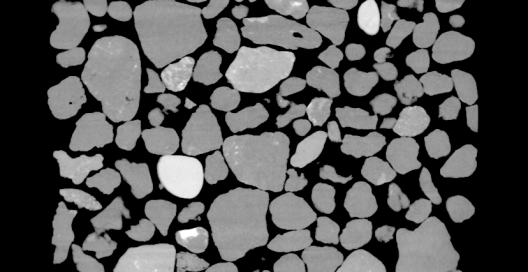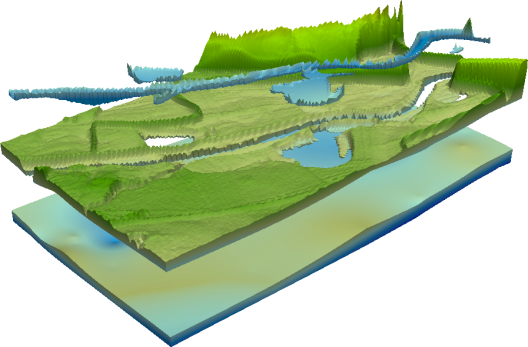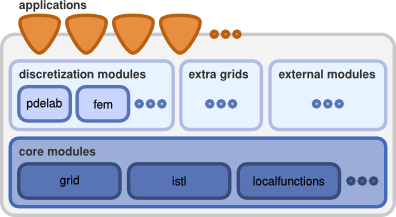Overview and focus
Many of our applications origin from porous media or biological systems, which exhibit very different kinds of complexity. Complexity can origin from a complicated geometric shapes, which poses a challenge for the numerical solution of PDEs in the complex shaped domain. The other kind of complexity is complexity of the system itself, due to complex couplings between different physical, biological & chemical processes.
Complex Geometries

© TODO When solving of PDEs on time dependent domains or domains with a complex shape, classic Finite Element Methods pose many problems regarding the construction of the mesh. During the last decade a range of different methods have been developed to decouple the construction of a finite element mesh, i.e. the finite element discretization, from the geometrical details of the domain.
One approach, our group is working on, is the Unfitted Discontinuous Galerkin method. It offers the possibility to compute simulations with a fine structures on a relatively coarse mesh and was used for the solution of elliptic, parabolic and hyperbolic problems. Using the UDG approach it is easily possible to run simulations directly on image data, e.g. micro-CT images, or to combine it with level-set or phase-field methods to handle moving interfaces.
Multi-Physics Problems

© TODO In the course of multi-physics applications the efficient coupling of different PDEs on different sub-domains is getting more important. We are working on different aspects of domain decomposition methods and their implementation, either for parallelization and preconditioning, or for the coupling in a multi-physics setting. The latter also includes heterogenous coupling of sub-domains of different dimension.
Efficient PDE Software

Dune© TODO We set high value on the development of efficient FEM software. Reusability and interoperability of and with existing software are very important. In this course we are actively participating in the development of the C++ FEM framework DUNE.
Programming with C++ and using generic programming techniques, allows us to use fine grained interfaces and still employ optimization techniques, like inlining and loop-unrolling. This is the basis for sustainable and efficient software development.
High Performance Computing

© TODO The speed of a single processor stopped growing in the last years, instead modern chips include many cores to increase the performance. At the same time the architecture of high performance computers like the BlueGene is changing, they include acceleration processors which leaves us with a heterogeneous hardware system. Modern scientific software must cope with these changing requirements. As it is too much a burden to expect scientist to rewrite their code for each new hardware, the software design and the numerical algorithms must be adopted in a way that allows us to port our software with as small work as possible, while still retaining a reasonable performance boost.
Research WG Applications of PDEs - Prof. Dr. Christian Engwer
Latest Publications
- . . Construction of local reduced spaces for Friedrichs' systems via randomized training arXiv. doi: 10.48550/arXiv.2404.18839. [accepted / in Press (not yet published)]
- . . Model order reduction of an ultraweak and optimally stable variational formulation for parametrized reactive transport problems arXiv. doi: 10.48550/arXiv.2310.19674. [accepted / in Press (not yet published)]
- . . ‘An optimally stable approximation of reactive transport using discrete test and infinite trial spaces.’ In Finite Volumes for Complex Applications X—Volume 2, Hyperbolic and Related Problems, edited by , 289–298. Cham: Springer. doi: 10.1007/978-3-031-40860-1_30.
- . ‘Brainstorm-DUNEuro: An integrated and user-friendly Finite Element Method for modeling electromagnetic brain activity.’ NeuroImage 267: 119851. doi: 10.1016/j.neuroimage.2022.119851.
- . ‘CutFEM forward modeling for EEG source analysis.’ Frontiers in Human Neuroscience 17: 1216758. doi: 10.3389/fnhum.2023.1216758.
- . . ‘The DUNE Framework: Basic Concepts and Recent Developments.’ Computers & Mathematics with Applications 81: 75–112. doi: 10.1016/j.camwa.2020.06.007.
- . . ‘Monotonicity considerations for stabilized DG cut cell schemes for the unsteady advection equation.’ Contributed to the ENUMATH2019, Egmond aan Zee, The Netherlands.
- . . ‘Strategies for the vectorized Block Conjugate Gradients method.’ Contributed to the ENUMATH2019, Egmond aan Zee, The Netherlands.
- . . ‘DUNEuro- A software toolbox for forward modeling in bioelectromagnetism.’ PloS one 2021. doi: 10.1371/journal.pone.0252431.
- . . Hardware-Oriented Krylov Methods for High-Performance Computing Dissertation thesis, WWU Münster.
Supervised Doctoral Studies
Wenske, Michael Data-aware methods for the simulation of glioblastoma multiforme Sommer, Liesel An unfitted discontinuous Galerkin scheme for a phase-field approximation of pressurized fractures Buhr, Andreas Towards Automatic and Reliable Localized Model Order Reduction. Local Training, a Posteriori Error Estimation and Online Enrichment. Piastra, Maria Carla New Finite Element Methods for MEG and combined EEG/MEG Forward Problem Nüßing, Andreas Fitted and unfitted finite element methods for solving the EEG forward problem Emken, Natalie A coupled bulk-surface reaction-diffusion-advection model for cell polarization Vorwerk, Johannes New Finite Element Methods to Solve the EEG/MEG Forward Problem Vorwerk, Johannes New Finite Element Methods to solve the EEG/MEG Forward Problem Knappitsch, Markus DTI data based multiscale modelling and simulation of glioma growth
Projects
In Process
- NIH Grant Number: 1 R01 EB 026299-01 – BrainStorm: Highly Extensible Software for Advanced Electrophysiology and MEG/EEG Imaging (since )
Own Resources Project - EXC 2044 - C1: Evolution and asymptotics ( – )
Subproject in DFG-Joint Project Hosted at the University of Münster: DFG - Cluster of Excellence | Project Number: EXC 2044/1 - EXC 2044 - C2: Multi-scale phenomena and macroscopic structures ( – )
Subproject in DFG-Joint Project Hosted at the University of Münster: DFG - Cluster of Excellence | Project Number: EXC 2044/1 - EXC 2044 - C4: Geometry-based modelling, approximation, and reduction ( – )
Subproject in DFG-Joint Project Hosted at the University of Münster: DFG - Cluster of Excellence | Project Number: EXC 2044/1 - InterKIWWU – Interdisziplinäres Lehrprogramm zu maschinellem Lernen und künstlicher Intelligenz ( – )
Individual Granted Project: Federal Ministry of Education and Research | Project Number: 16DHBKI049 - Reconstruction of epilepsy-characteristic sources by means of a simultaneous evaluation of EEG- and MEG- data using calibrated realistic head models (since )
Own Resources Project
Finished
- PerEpi – Personalised diagnosis and treatment for refractory focal paediatric and adult epilepsy ( – )
EU-Project Hosted at University the of Münster: EC H2020 - ERA-NET Cofund | Project Number: ERAPERMED2020-227 - HyperCut – Stabilized DG schemes for hyperbolic conservation laws on cut cell meshes ( – )
Individual Granted Project: DFG - Individual Grants Programme | Project Number: EN 1042/5-1 - Solvers 2019 – Project-Specific Workshop "Advanced Solvers for modern Architectures 2019" ( – )
Scientific Event: Participation / conference fees , DFG - Priority Programme - HPC²SE – Verbundprojekt: HPC2SE - Hardware- und Leistungsorientierte Codegenerierung für Informatik und Ingenieurwesen ( – )
participations in bmbf-joint project: Federal Ministry of Education and Research | Project Number: 01IH16003B - GlioMaTh – Verbundprojekt 05M2016 - GlioMaTh: Gliomen, Mathematische Modelle und Therapieansätze - Teilprojekt 2 ( – )
participations in bmbf-joint project: Federal Ministry of Education and Research | Project Number: 05M16PMA - EXC 1003 A6 - Motion Analysis in Cellular Systems ( – )
Subproject in DFG-Joint Project Hosted at the University of Münster: DFG - Cluster of Excellence | Project Number: EXC1003/1 - EXA-DUNE – SPP 1648: Software for Exascale Computing - Subproject: EXA-DUNE - Flexible PDE Solvers, Numerical Methods, and Applications ( – )
Subproject in DFG-Joint Project Hosted outside the University of Münster: DFG - Priority Programme | Project Number: EN 1042/2-2; OH 98/5-2 - Konzeption und Evaluation geometrischer Mehrgitterlöser für discontinuous Galerkin Elastizitätsproblem auf Cut-Cell-Gittern (CCMGE) ( – )
Individual Granted Project: Siemens AG | Project Number: 9702107839 - Derivation, analysis and validation of model reduction methods for the approximation of parameterized Maxwell equations ( – )
Individual Granted Project: CST AG - MKOVG – Massenerhaltende Kopplung von Oberflächen- und Volumenprozessen auf impliziten, zeitabhängigen Gebieten ( – )
Individual Granted Project: DFG - Individual Grants Programme | Project Number: EN 1042/4-1 - EXA-DUNE – SPP 1648: Software for Exascale Computing - Subproject: EXA-DUNE - Flexible PDE Solvers, Numerical Methods, and Applications ( – )
Subproject in DFG-Joint Project Hosted outside the University of Münster: DFG - Priority Programme | Project Number: EN 1042/2-1; OH 98/5-1 - Workshop: Numerical Schemes for Surface PDE's ( – )
Scientific Event: Participation / conference fees - Efficient solvers for DG discretizations of saddle point problems ( – )
participations in other joint project: German Academic Exchange Service - Anpassung des Simulationsframeworks DUNE zur Deichsimulation ( – )
Individual Granted Project: Siemens AG
- NIH Grant Number: 1 R01 EB 026299-01 – BrainStorm: Highly Extensible Software for Advanced Electrophysiology and MEG/EEG Imaging (since )

